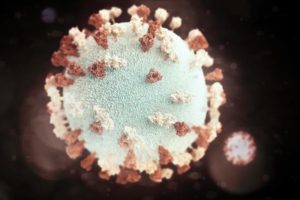The Massachusetts Department of Public Health (DPH) Friday alerted greater Boston healthcare providers and local boards of health to a mumps outbreak after 12 cases have been reported since the end of March.
To date, the vast majority of confirmed and probable mumps cases in Massachusetts have been among vaccinated college students and others linked to colleges and universities.

The 12 new cases are among adults ranging in age from 20 to 41 and living in Chelsea, Boston, and Revere with no known connection to higher education, and public health officials say that may represent a change in the epidemiology of mumps in Massachusetts.
The residents presented symptoms of mumps between March 24 and May 31; 10 of the 12 have shown signs of illness since May 9. All of the residents are Latino and include members of the Colombian, Dominican, Guatemalan, and Salvadoran communities. None is known to have traveled internationally prior to becoming ill. For the majority of the residents, vaccination histories are unknown; most are believed to be unvaccinated against mumps.
DPH and local health departments are investigating these cases and instituting isolation and quarantine measures to control the spread of mumps, which is spread by droplets among people in close contact. Unvaccinated individuals are most susceptible to mumps infection.
“MMR vaccination is highly protective against mumps and is recommended for children and adults,” said Public Health Commissioner Monica Bharel, MD, MPH, referring to the Measles, Mumps, and Rubella (MMR) vaccine. “In addition, those who have mumps should stay isolated at home for 5 days after their onset of swelling. Mumps is usually a mild disease but can cause serious illness. If you think you have mumps, stay home and call your healthcare provider.’’
DPH will be reaching out to Latino communities in Massachusetts to increase awareness about mumps and to encourage vaccination. Mumps virus is spread through infected respiratory tract secretions. It can be spread within three to six feet when an infected person coughs or sneezes or with direct contact with infected secretions (e.g. sharing water bottles). The incubation period can range from 12 to 25 days. Parotitis (swelling of the salivary glands) is the most common symptom (30-65%), but non‐specific symptoms such as myalgia, anorexia, malaise, headache, and low‐grade fever may precede the parotitis by several days. In the pre-vaccine era, 15-30% of infections were asymptomatic.
People are considered infectious from two days before symptoms begin until five days after the onset of parotid swelling. Therefore, those suspected of mumps should be isolated and should refrain from public activities for five days after the onset of swelling.
In 2016, Massachusetts experienced a large mumps outbreak with 252 reported cases, which is more than 15 times the usual number of mumps cases. Those cases were part of a national mumps outbreak, which saw more than 5,800 mumps cases, the largest number in a decade.
So far this year the mumps outbreak continues in Massachusetts, with nearly 300 suspected cases of mumps investigated and 35 cases confirmed.
Related:
- Venezuela reports 86 diphtheria cases in 1st four months of 2017
- Bangladesh: Anthrax outbreak sickens 25, kills one
- Indonesia: Leptospirosis kills eight in Kulon Progo
- Sen. Schumer calls on HHS Sec Price to implement Lyme disease law immediately
- Zambia typhoid outbreak incidence dropping
- Lyme disease: Global Lyme Diagnostics announces new test is available



